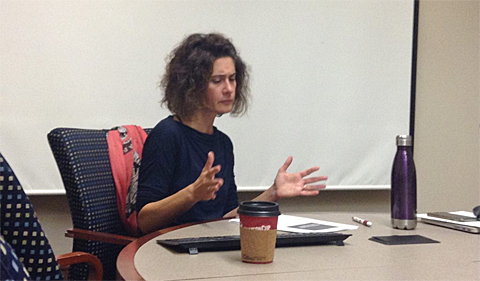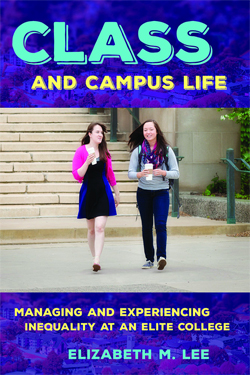
Dr. Lee answers questions from University faculty at the colloquium.
by Matt McCullough ‘17
The Sociology & Anthropology Colloquium met Sept. 30 for a talk by Dr. Elizabeth Lee about her recently published book, Class and Campus Life: Managing and Experiencing Inequality at an Elite College.
 Published earlier this year by Cornell University Press, Lee’s book studies the inequality experienced by the students who come from a low socioeconomic background at an elite liberal arts college for women.
Published earlier this year by Cornell University Press, Lee’s book studies the inequality experienced by the students who come from a low socioeconomic background at an elite liberal arts college for women.
Lee spent two years interviewing numerous students and faculty from the college, focusing on students from low-socioeconomic status backgrounds. The main focus of her talk was the experiences of working-class, low-income, and/or first-generation students attending a college where most students are from the privileged upper classes.
Facing Common Attitudes Income Inequality
The colloquium presentation, titled “How We Talk about Class on Campus: Language, Silence, and Inequality” gave the highlights of her findings, in which she lists three ways that campus community members managed class inequality among students.
An important underlying thread to all of these was the prevalence of implicit moral judgments associated with class.
Some of the judgments experienced by these students are familiar stigmatization of low-socioeconomic status people in American culture: that they are lazy, unintelligent, etc. The students interviewed expressed difficulty talking about class differences with students who come from more privileged families.
Some of the respondents also expressed a feeling of indebtedness to the college, worried that others think they are unworthy and owe a debt to the college that goes beyond finances.
Lee found that there are three ideas to discuss on the inequality of socioeconomic status in education. Those ideas are that inequality is somewhere else and not at the college, that inequality can be overcome, and that inequality is not supposed to be spoken about.
‘Not at My College’
The first idea, that inequality is not present, conveys that the people at this particular college deny that this inequality exists. One reason for this, Lee explains, is simply the setting of the college.
Most elite colleges, including the one in the book, present an image of knowledge and status within the design of its campus. The grounds are well-kept, the buildings are historical and architectural points of interest, and the people are renowned and cultured.
How could a place like this possibly have inequality?
The denial of the existence of this inequality, according to the students Lee interviewed, causes a lack of understanding. It is an invalidation of the student’s feelings. It makes it that much harder for these students to build connections with people, and to have their issues resolved when their issues are not even being recognized.
‘Shake it Off’
The next main idea is that inequality can be overcome.
Although this attitude is well-meaning, it is inaccurate nonetheless. The students involved in the study were told by others that their past did not matter anymore. What mattered was that these girls made it to where they are now.
As heartening as it may be to think that way, inequality cannot be dusted off such. The stigmas and labels associated with coming from a lower class background are more complicated. In some cases, Lee found, students wanted to hold on to their roots.
In both cases, students felt externally compelled to release their pasts whether or not they can or want to.
‘Just Keep it to Yourself’
The third and last main idea is that inequality is supposed to be kept secret and not discussed.
It was the most surprising that students felt the impression that it was impolite to discuss their concerns with the class inequality or that their friends did not want to talk about these issues. Unsurprisingly, students felt very isolated when it seemed that no one wanted to hear their issues.
Implications of These Attitudes
Why does it matter that these attitudes about inequality change?
There are certain implications caused by these attitudes that can impact the lives of these students. Inequality at elite colleges based on class, it is safe to assume, is not exclusive to the one college where Lee conducted her study.
Any student from lower classes may face these implications when attending any college of note. It is important to combat these implications for students to be able to persist graduation, to build connections and social integration, and to ensure their own healthy mental well-being.
Facing this inequality and the attitudes associated with it, students could suffer. Feelings of social isolation and high levels of stress could lead students to leaving their school.
Spreading the Word
Lee is traveling in the coming weeks to discuss her book at American University and Lafayette College.


















Comments